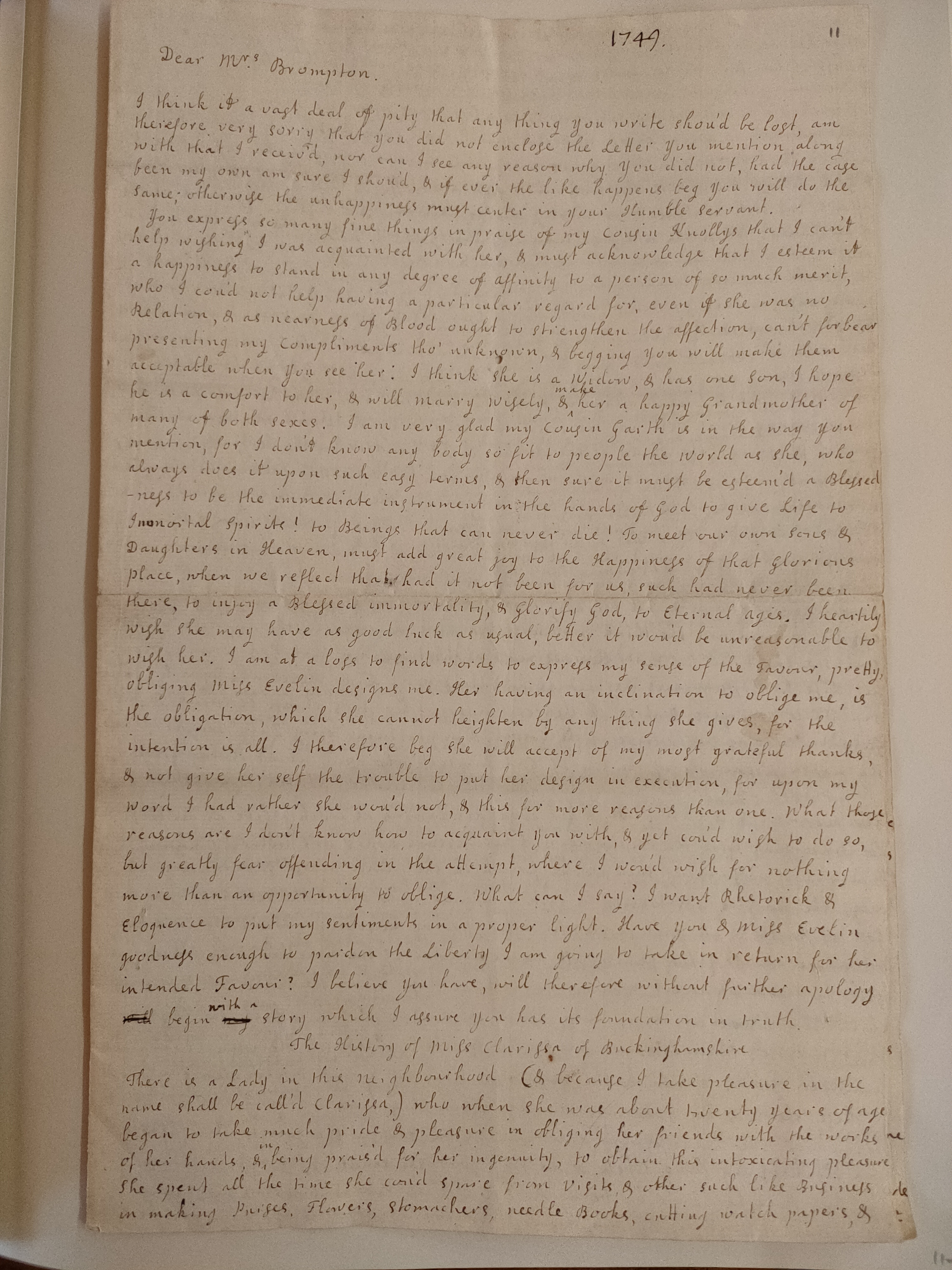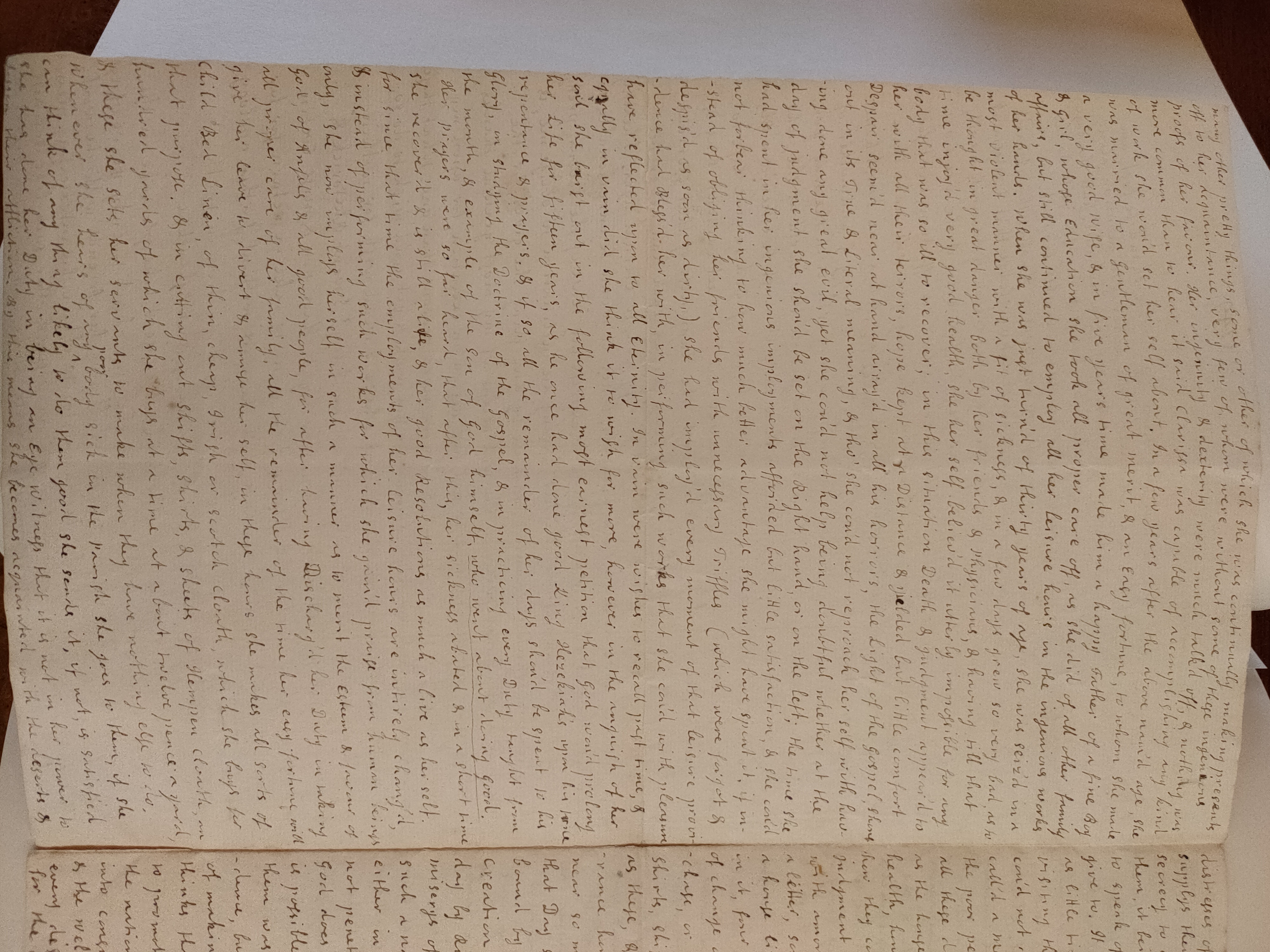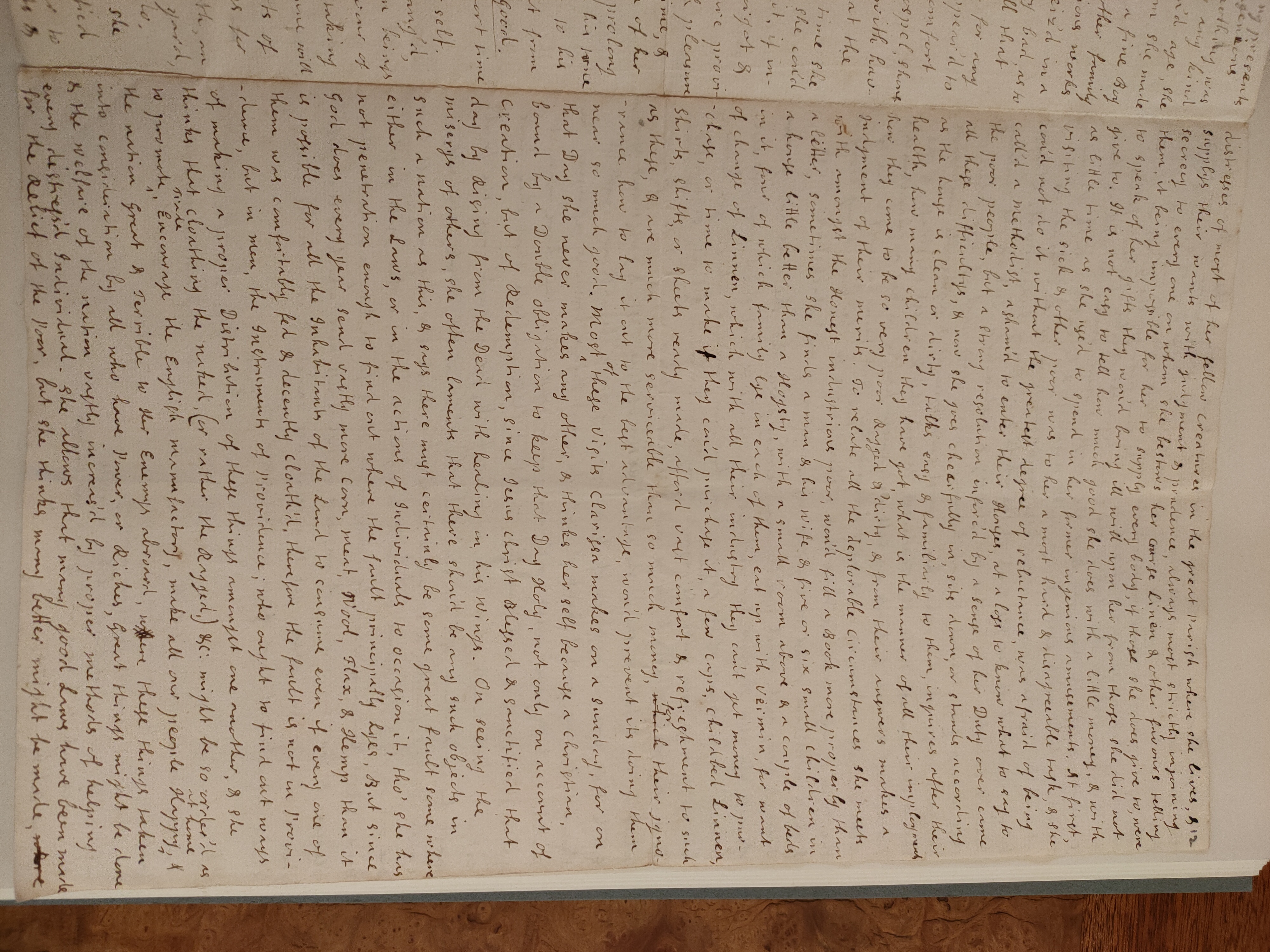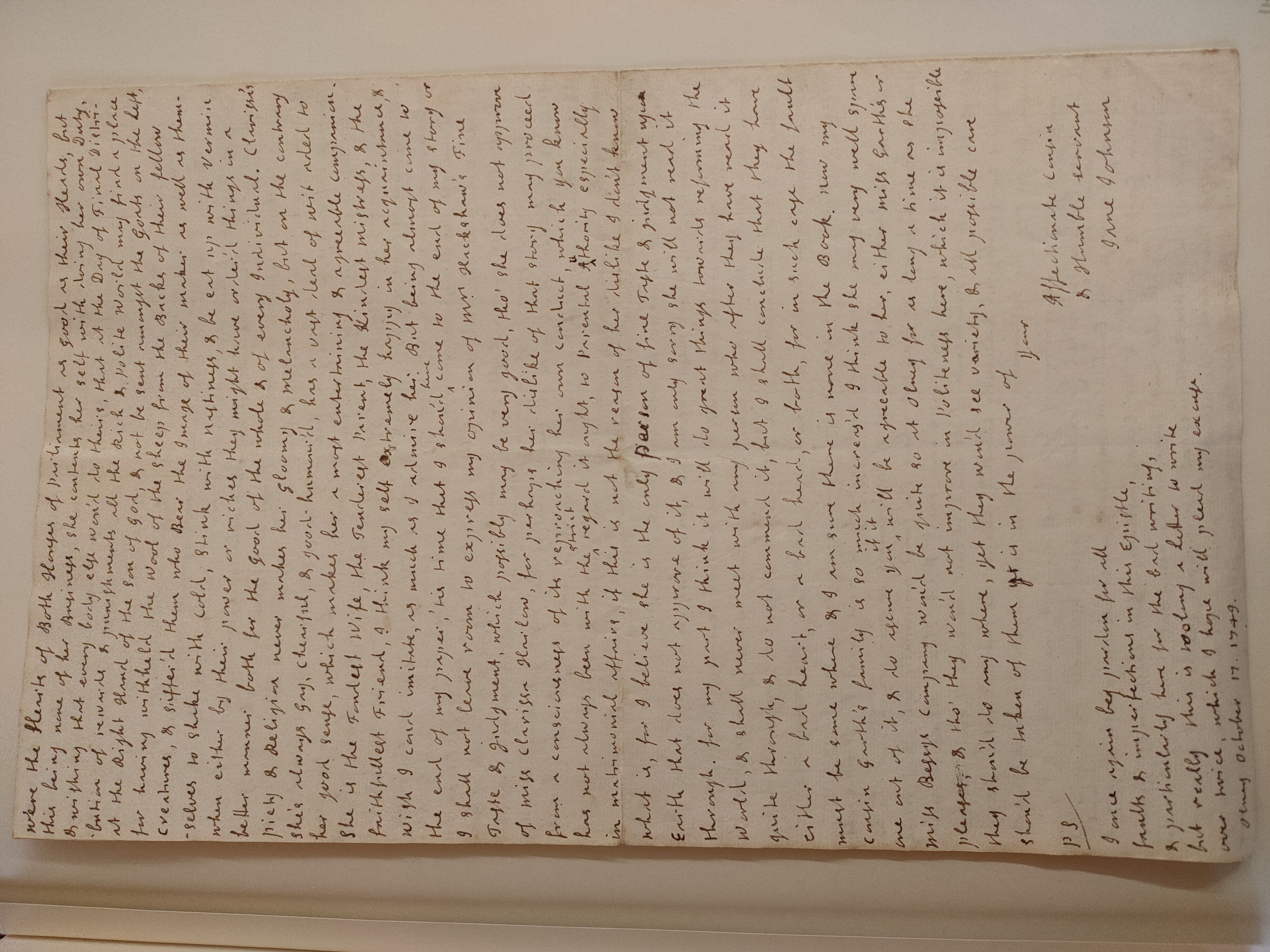1301 - Jane Johnson to Mrs Brompton, 17 October 1749
- Transcription
- Letter Details
- People (1)
- How to Cite
Image 1 of 4

Image 2 of 4

Image 3 of 4

Image 4 of 4

I think it a vast deal of pity that any thing you write shou’d be lost, am
therefore very sorry that you did not enclose the Letter you mention along
with what I receiv’d nor can I see any reason why you did not, had the case
been my own am sure I shou’d, & if ever the like happens beg you will do the
same; otherwise the unhappiness must center in your Humble servant.
You express so many fine things in praise of my Cousin Knollys that I can’t
help wishing I was acquainted with her, & must acknowledge that I esteem it
a happiness to stand in any degree of affinity to a person of so much merit,
who I cou’d not help having a particular regard for, even if she was no
Relation, & as nearness of Blood ought to strengthen the affection, can’t forbear
presenting my Compliments tho’ unknown & begging you will make them
acceptable when you see her: I think she is a Widow, & has one son, I hope
he is a comfort to her, & will marry wisely, & {^make} her a happy Grandmother of
many of both sexes. I am very glad my Cousin Garth is in the way you
mention, for I don’t know any body so fit to people the world as she, who
always does it upon such easy terms, & then sure it must be esteem’d a Blessed
-ness to be the immediate instrument in the hands of God to give Life to
Immortal Spirits! To Beings that can never die! To meet our own sons &
Daughters in Heaven, must add great joy to the Happiness of that Glorious
place, when we reflect that had it not been for us, such had never been
there, to injoy a Blessed immortality, & Glorify God, to Eternal ages. I heartily
wish she may have as good luck as usual, better it wou’d be unreasonable to
wish her. I am at a loss to find words to express my sense of the Favour, pretty
obliging Miss Evelin designs me. Her having an inclination to oblige me, is
the obligation, which she cannot heighten by any thing she gives, for the
intention is all. I therefore beg she will accept of my most grateful thanks,
& not give her self the trouble to put her design in execution, for upon my
word I had rather she wou’d not, & this for more reasons than one. What those
reasons are I don’t know how to acquaint you with, & yet cou’d wish to do so,
but greatly fear offending in the attempt, where I wou’d wish for nothing
more than an opportunity to oblige. What can I say? I want Rhetorick &
Eloquence to put my sentiments in a proper light. Have you & Miss Evelin
goodness enough to pardon the Liberty I am going to take in return for her
intended Favour? I believe you have, will therefore without further apology
The history of Miss Clarissa of Buckinghamshire
There is a Lady in this neighbourhood (& because I take pleasure in the
name shall be call’d Clarissa) who when she was about twenty years of age
began to take much pride & pleasure in obliging her friends with the works
of her hands, &, {^in} being prais’d for her ingenuity, to obtain this intoxicating pleasure
she spent all the time she cou’d spare from visits, & other such like Business
in making Purses, Flavers, Stomachers, needle Books, cutting watch papers, &
[f.11v]
many other pretty things, some or other of which she was continually making presents
off to her acquaintance, very few of whom were without some of these ingenious
proofs of her favour. Her ingenuity & dexterity were much talk’d off, & nothing was
more common that to hear it said Clarissa was capable of accomplishing any kind
of work she wou’d set her self about
[next two pages, an extract from her novel, not transcribed]
[f.12v]
But being almost come to
the end of my paper, ‘tis time that I shou’d {^have} come to the end of my story or
I shall not leave room to express my opinion of Mr Hackshaw’s Fine
Taste & Judgment, which possibly may be very good, tho’ she does not approave
of Miss Harlow, for perhaps her dislike of that story may proceed
from a consciousness of its reproaching her own conduct, which you know
has not always been with the {^strict} regard it ought, to Parental A{^uthority especially
in matrimonial affairs, if this is not the reason of her dislike I don’t know
what is, for I believe she is the only Person of fine Taste & judgment upon
Earth that does not approve of it, & I am only sorry she will not read it
through. For my part I think it will do great things towards reforming the
World, & shall never meet with any person who after they have read it
quite through, & do not command it, but I shall conclude that they have
either a bad heart, or a bad head, or both, for in such case the fault
must be some where & I am sure there is none in the Book. Now my
Cousin Garth’s family is so much increas’d I think she may very well spare
me out of it, & do assure you {^if it} will be agreeable to her, either Miss Garth’s or
Miss Besseys Company wou’d be quite so at Olney for as long as time as she
pleases, & tho’ they wou’d not improve in Politeness here, which it is impossible
they shou’d do any where, yet there wou’d see variety, & all possible care
shou’d be taken of them yet is in the power of
your
Affectionate Cousin
& Humble Servant
Jane Johnson
PS/
I once again beg pardon for all
faults & imperfections in this Epistle
& particularly here for the bad writing,
but really this is too long a Letter to write
over twice, which I hope will plead my excuse
Olney October 17. 1749
I think it a vast deal of pity that any thing you write should be lost, am
therefore very sorry that you did not enclose the Letter you mention along
with what I received nor can I see any reason why you did not, had the case
been my own am sure I should, & if ever the like happens beg you will do the
same; otherwise the unhappiness must centre in your Humble servant.
You express so many fine things in praise of my Cousin Knollys that I can’t
help wishing I was acquainted with her, & must acknowledge that I esteem it
a happiness to stand in any degree of affinity to a person of so much merit,
who I could not help having a particular regard for, even if she was no
Relation, & as nearness of Blood ought to strengthen the affection, can’t forbear
presenting my Compliments though’ unknown & begging you will make them
acceptable when you see her: I think she is a Widow, & has one son, I hope
he is a comfort to her, & will marry wisely, & {^make} her a happy Grandmother of
many of both sexes. I am very glad my Cousin Garth is in the way you
mention, for I don’t know any body so fit to people the world as she, who
always does it upon such easy terms, & then sure it must be esteemed a Blessed
-ness to be the immediate instrument in the hands of God to give Life to
Immortal Spirits! To Beings that can never die! To meet our own sons &
Daughters in Heaven, must add great joy to the Happiness of that Glorious
place, when we reflect that had it not been for us, such had never been
there, to enjoy a Blessed immortality, & Glorify God, to Eternal ages. I heartily
wish she may have as good luck as usual, better it would be unreasonable to
wish her. I am at a loss to find words to express my sense of the Favour, pretty
obliging Miss Evelin designs me. Her having an inclination to oblige me, is
the obligation, which she cannot heighten by any thing she gives, for the
intention is all. I therefore beg she will accept of my most grateful thanks,
& not give her self the trouble to put her design in execution, for upon my
word I had rather she would not, & this for more reasons than one. What those
reasons are I don’t know how to acquaint you with, & yet could wish to do so,
but greatly fear offending in the attempt, where I would wish for nothing
more than an opportunity to oblige. What can I say? I want Rhetoric &
Eloquence to put my sentiments in a proper light. Have you & Miss Evelin
goodness enough to pardon the Liberty I am going to take in return for her
intended Favour? I believe you have, will therefore without further apology
The history of Miss Clarissa of Buckinghamshire
There is a Lady in this neighbourhood (& because I take pleasure in the
name shall be called Clarissa) who when she was about twenty years of age
began to take much pride & pleasure in obliging her friends with the works
of her hands, &, {^in} being praised for her ingenuity, to obtain this intoxicating pleasure
she spent all the time she could spare from visits, & other such like Business
in making Purses, Flavers, Stomachers, needle Books, cutting watch papers, &
[f.11v]
many other pretty things, some or other of which she was continually making presents
off to her acquaintance, very few of whom were without some of these ingenious
proofs of her favour. Her ingenuity & dexterity were much talked off, & nothing was
more common that to hear it said Clarissa was capable of accomplishing any kind
of work she would set her self about
[next two pages, an extract from her novel, not transcribed]
[f.12v]
But being almost come to
the end of my paper, ‘tis time that I should {^have} come to the end of my story or
I shall not leave room to express my opinion of Mr Hackshaw’s Fine
Taste & Judgment, which possibly may be very good, though she does not approve
of Miss Harlow, for perhaps her dislike of that story may proceed
from a consciousness of its reproaching her own conduct, which you know
has not always been with the {^strict} regard it ought, to Parental A{^uthority especially
in matrimonial affairs, if this is not the reason of her dislike I don’t know
what is, for I believe she is the only Person of fine Taste & judgment upon
Earth that does not approve of it, & I am only sorry she will not read it
through. For my part I think it will do great things towards reforming the
World, & shall never meet with any person who after they have read it
quite through, & do not command it, but I shall conclude that they have
either a bad heart, or a bad head, or both, for in such case the fault
must be some where & I am sure there is none in the Book. Now my
Cousin Garth’s family is so much increased I think she may very well spare
me out of it, & do assure you {^if it} will be agreeable to her, either Miss Garth’s or
Miss Besseys Company would be quite so at Olney for as long as time as she
pleases, & though they would not improve in Politeness here, which it is impossible
they should do any where, yet there would see variety, & all possible care
should be taken of them yet is in the power of
your
Affectionate Cousin
& Humble Servant
Jane Johnson
PS/
I once again beg pardon for all
faults & imperfections in this Epistle
& particularly here for the bad writing,
but really this is too long a Letter to write
over twice, which I hope will plead my excuse
Olney October 17. 1749
Jane Johnson to Mrs Brompton, 17 October 1749
A long letter which includes an extract from Johnson’s own novel Clarissa (not transcribed due to length). Brompton has written things in praise of Johnson’s Cousin Knollys, and Johnson wishes she had met her. She is glad to hear that her Cousin Garth is pregnant, no one is more suited to raising children, and Johnson reflects upon the Christian joy of raising children, “immortal spirits”, and being reunited with them in heaven. Discussion of pretty Miss Evelin. Johnson thinks her book will be improving and assumes that those who do not like it would have ‘a bad heart’ or ‘a bad head’. She invites young Miss Garth or Miss Bessey to stay, not so much to improve them in politeness, but to give them a change of scenery. She apologises for errors in her writing.
Johnson Family
MS. Don. c. 190 f.11
Bodleian Libraries, University of Oxford
1749
10
17
Olney, Buckinghamshire [England]
[England]
primary author
writing
- happy
- hopeful
- regret
- faith
- personal blessings
god
To Cite this Letter
Jane Johnson to Mrs Brompton, 17 October 1749, 17101749: Bodleian Libraries, University of Oxford, Johnson Family, MS. Don. c. 190 f.11
To Cite this Edition
Material Identities, Social Bodies: Embodiment in British Letters c.1680-1820. Compiled by: Karen Harvey, Helen Esfandiary, Sarah Fox, Emily Vine, University of Birmingham. Project funded by the Leverhulme Trust (2021-2025, Ref. RPG-2020-163), https://socialbodies.bham.ac.uk.